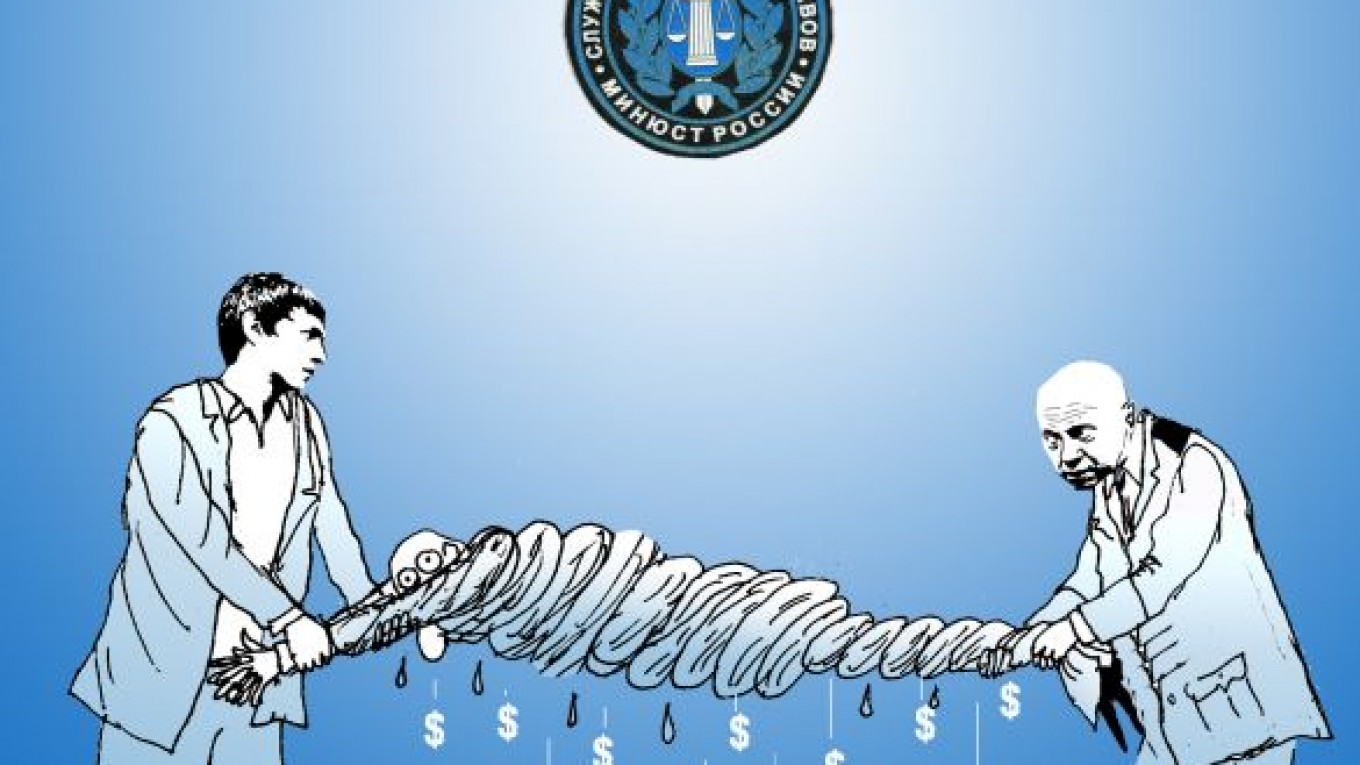DTV’s new drama series “Bailiffs” aims to bring a touch of humanity to the service, which for one reason or another, has always had a bit of an image problem.
The series is filmed in the real offices of the Federal Court Bailiff Service in the Leningrad region, with some real officers playing bit parts, and the credits promise that it is “based on real events.” The characters wear neatly pressed dark uniforms, blue shirts and epaulets. The service said it wanted the show to “answer the question: Who are the federal court bailiffs and how do they help people solve their problems?”
Admittedly, I am not sure who watches DTV at 1 p.m. on a weekday, although possibly they are targeting the housewife who has fallen behind on her repayments on the widescreen television.
The show is described as a comedy, although the episode I saw was not really funny but did have a happy ending (the company got a 10-day stay of execution to pay back a debt). But I am pretty sure we will not see any beloved pedigree kittens seized or families thrown shivering out into the snow.
Grizzled senior bailiff Dmitry Vasilyevich is known as a “legendary master” in the business, so when he is given a cocky long-haired student, Andrei, as an intern, sparks fly, but an unlikely partnership forms.
None of the actors in the show are famous, unlike the ones who star in police shows, which makes me think that rightly or wrongly, no one really wanted to become the public face of the bailiffs.
The show has a certain cosy appeal but is so intent on explaining what the bailiffs do — arrest property on a court order — and definitely don’t do (take bribes) that it forgets to have believable dialogue.
“When you are doing an internship at the bailiffs you must know you have power given to you by the government of the Russian Federation and you should not for a second forget about the responsibility given to you by that power,” Dmitry Vasilyevich lectures his intern in one indigestible line.
The series reminds me of the FSB’s annual arts prize, where they reward books and television series that show the security service in a good light. A rather intriguing idea but highly unlikely to change public perceptions, even if someone concocts a Mr. Darcy in plainclothes.
In the episode I saw, Andrei and Dmitry Vasilyevich were working with a company in debt and found that a “werewolf in epaulets” of a bailiff had got there before them and demanded — shock horror — a bribe.
Now Dmitry Vasilyevich assures his clients that “we do not practice this.” He wracks his brains over who could be responsible, with suspicion falling on a luscious brunette bailiff, as well as on poor long-suffering Andrei. “Why did it have to happen in my department. Why did I have to get a rat?” he agonizes, head in hands.
Luckily it turns out that it was Andrei’s ex-girlfriend who sneaked a look at his files and extorted the money so her mother could keep up with her mortgage payments.
Twinkly-eyed Dmitry Vasilyevich solves the mystery and knocks the pair’s heads together. “I hope you understand that you dealt a serious blow to the reputation of bailiffs,” he thunders, before dictating to them from his favorite book: the bailiff’s code of conduct. And he gives the company another 10 days to pay off their debt as thanks for their cooperation.
At the end of the 20-episode series, law student Andrei will reach an epiphany and make “the decision to come to work for the bailiffs,” the show’s web site promises.
A Message from The Moscow Times:
Dear readers,
We are facing unprecedented challenges. Russia's Prosecutor General's Office has designated The Moscow Times as an "undesirable" organization, criminalizing our work and putting our staff at risk of prosecution. This follows our earlier unjust labeling as a "foreign agent."
These actions are direct attempts to silence independent journalism in Russia. The authorities claim our work "discredits the decisions of the Russian leadership." We see things differently: we strive to provide accurate, unbiased reporting on Russia.
We, the journalists of The Moscow Times, refuse to be silenced. But to continue our work, we need your help.
Your support, no matter how small, makes a world of difference. If you can, please support us monthly starting from just $2. It's quick to set up, and every contribution makes a significant impact.
By supporting The Moscow Times, you're defending open, independent journalism in the face of repression. Thank you for standing with us.
Remind me later.






